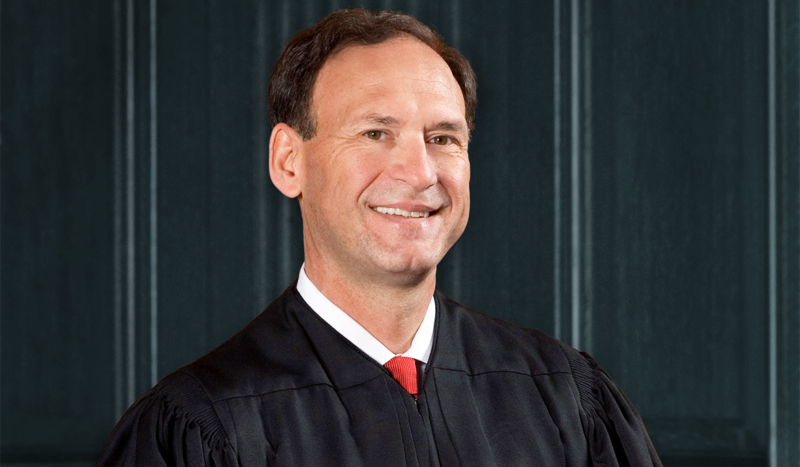
Franciscan University of Steubenville on Saturday celebrated its 76th commencement exercises, sending out nearly 900 students who heard Catholic U.S. Supreme Court Justice Samuel Alito urge them to “go out boldly,” but also warn that the freedoms of speech and religion are seriously endangered in our current culture.
In his commencement address, Alito told the graduating class – which broke a record for the largest in the school’s history for a fourth consecutive year – to leave Franciscan ready to “engage the world,” while still acknowledging that it’s “rough out there,” and “probably rougher … now that it has been for quite some time.”
Franciscan University President Fr. Dave Pivonka, TOR ’89, introduced Alito, who received an honorary doctorate in Christian ethics “for his decades of exemplary public service and tireless efforts to protect and uphold justice and the rule of law.”
Pivonka first cited the associate justice’s majority opinion in Burwell v. Hobby Lobby (2014), which upheld religious freedom. A lengthy standing ovation for Alito erupted next when Pivonka cited his majority opinion in Dobbs v. Jackson Women’s Health Organization (2022), which held the United States Constitution does not confer a right to abortion.
During his address, the Supreme Court justice focused primarily on the Constitution, referring to it as “the source that has formed the backbone of my work as a judge for the past 30 years.”
“I believe that our Constitution could not have endured, and could not have provided the framework for our country’s growth, if it did not rest on a deep understanding of human nature and human behavior,” he said.
He highlighted some of the lessons “the Constitution teaches us” – lessons that apply to everyday life. The first of these, he noted, is “the need to be rigorous and disciplined in identifying the things that are most fundamental.”
“A striking feature of our Constitution is its brevity … our Constitution is brief because it focuses on the things that are essential,” the associate justice observed:
It sets out the structure of the government, it protects basic rights and then it leaves just about everything else to be decided by the American people acting through their elected representatives …The framers’ strategy, a disciplined identification of what is fundamental has served our country well. And this same strategy is a good one to implement in our personal lives … we can make the effort to keep in mind what is fundamental and permanent in our lives. And that is absolutely critical. Because the things that call out most loudly for our attention on a daily basis are not necessarily the things that matter most in the end.
Another lesson taught by the Constitution, Alito said, “is that it guards against improvident change.”
“The constitution is exceedingly hard to change,” he explained:
An amendment must be approved by two-thirds of both houses of Congress and it must be ratified by three-quarters of the states. And because the amendment process is so difficult, our Constitution has been amended only 27 times this date, despite the fact that more than 10,000 proposed amendments have been considered in Congress.
Alito elaborated that the framers “deliberately” made the process of amending the Constitution strenuous because of their “understanding of the nature of the fundamental rights that are protected by the Constitution.”
He continued:
I’m sure we all remember the famous words of the Declaration of Independence, “all men are created equal,” and “they are endowed by their Creator with certain unalienable rights.” That short and famous statement speaks volumes and one of the most important things it says is that there are certain moral principles that are true and immutable. These principles of right and wrong are not relative or circumstantial. They are not of our making, and it is not within our power to change them.
Alito added that the Constitution’s framers anticipated there would be times “when rulers and people would become restive” and when “the principles of constitutional liberty would be imperiled unless established by irreparable law.”
“[U]nder all circumstances, this same fundamental idea that there are certain principles that we cannot compromise without paying a fearsome price applies to our personal lives,” he said. During such times, “if we have fixed and clear principles, principles that are written in bold letters on our hearts, we may be able to find our way through. If we don’t, we can easily go astray.”
Alito observed that “troubled waters” are currently “slamming against some of our most fundamental principles.” But he pointed out another lesson to be drawn from the Constitution: a “respect for reason and civil discourse.”
He spoke to the graduates about the challenges that lie ahead as they leave school:
Support for freedom of speech is declining, dangerously, especially where it should find broadest and widest acceptance. In a book called “The Idea of a University,” St. John Henry Newman saw the university as a place for reasoned debate. Today, very few colleges live up to that ideal. This place is one of the few that does, and you are very fortunate to have had that experience. Religious liberty is also threatened. When you venture out into the world, you may find yourself in a job or community or social setting where you will be pressured to endorse ideas you don’t believe or to abandon core beliefs. It will be up to you to stand firm.
“In the same way, your challenge during troubled times will be to distinguish between dedication to principles that never change, and mere nostalgia for the past,” he told the graduates. “In order to engage our society and try to make it a better place – that is essential. And that requires judgment and prudence.”
“That isn’t easy,” Alito concluded. “But what you have learned, and the habits of mind that your education has inculcated, should help you to meet that challenge. Our society needs you to do just that.”

